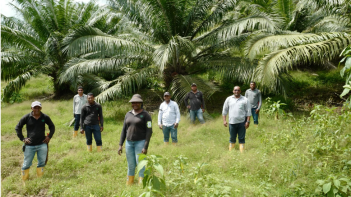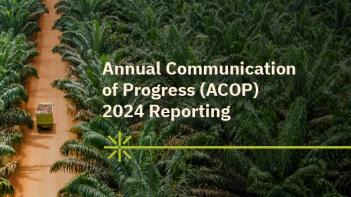The RSPO Principled & Criteria (P&C) 2013 has been ratified by the RSPO extraordinary General Assembly in April 2013. As stated in the preamble, the document is effective immediately. It also stated that following the requirement of RSPO Certification System, National Interpretations (NIs) must be revised to be fully consistent with the RSPO P&C 2013 within 12 months after the date of ratification. And, the certificate holders must be fully compliant with the P&C 2013 or new version of an NI within one year of it being completed (April 2015). Certified entities can continue to be certified after the date of ratification (May 2013) and before the completion of any relevant NI by conducting Annual Surveillance Assessments (ASA) against P&C 2007, but shall demonstrate compliance to the new RSPO P&C 2013 at the following ASA or not later than April 2015.
At this point of time (May 2014), National Interpretation Task Force (NITF) in Malaysia, Indonesia and other countries are progressing at various stages of NI processes. Public consultations of the draft country NI have been completed in Malaysia and Indonesia, to be followed with physical meetings to address the comments and come out with final document. The work is anticipated to take an extra few months prior to full completion.
It is therefore agreed that the NI Task Force will continue their work after May 2014. Nevertheless, the certificate holder must demonstrate full compliant to P&C 2013 by April 2015. For audit done between now and adoption of revised NI, Certification Bodies (CBs) and the certified units are given option to carry out audits using P&C 2007 or generic P&C 2013. If P&C 2007 is used, then another audit against P&C 2013 standard is required prior to May 2015. All the new certifications have to be conducted using P&C2013.
Keep reading

Call for Expression of Interest: Independent Investigation of a Complaint

Latin American Smallholders, Key Global Brands Gather in Peruvian Amazon to Advance Sustainable Palm Oil

RSPO Forum for Members and Certification Bodies 2025: Strengthening Capacities and Building Bridges with RSPO Members

From Violence to Prosperity: Cultivating Sustainable Palm Oil in San Pablo, Colombia

Palmas de Tumaco: Enduring, Trusting, and Transforming in Colombia’s Pacific Coast
Carry Over Credits for Certified Independent Smallholder Groups

From the Amazon to the Aisles: Discovering Sustainable Palm Oil in the Heart of Peru

Global Trends of Sustainable Palm Oil and China's Pathway




